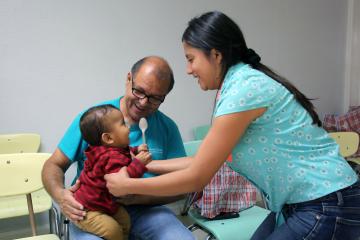
J-PAL LAC at 15: Expanding ECD programs through evidence in the region

Photo credit: UVG
As we mark fifteen years of J-PAL’s Latin America and the Caribbean (LAC) office, we are recapping key milestones and sharing what we have learned in a new blog series titled “J-PAL LAC at 15.” The series highlights lessons from working with those who make our mission a reality: our donors, implementing partners, J-PAL academic network, and staff. This is the second installation, focusing on our work with implementing partners. Read our other posts that spotlight how we work with donors to create a culture of evidence in LAC, feature exciting results from the Jobs and Opportunity Initiative Brazil, and discuss efforts to strengthen diversity and inclusion throughout our work.
Forty-five percent of children in Latin America and the Caribbean suffer from at least one moderate or severe deprivation, meaning that nearly 81 million children in Latin America are living under a form of extreme or moderate poverty. Evidence suggests that early childhood represents a brief but powerful opportunity to break the cycle of intergenerational poverty. The first 1,000 days of life are vital for stimulating brain development and ensuring long-term well-being. That is why evidence-based programs focused on these critical 1,000 days are essential for fostering long-term development, enhancing cognitive skills, and achieving positive educational outcomes. Such initiatives could lead to increased labor market earnings, reduced crime rates, and better mental health in adulthood. Although there is evidence which indicates that effective early childhood (ECD) programs exist, we still have much to discover about how to implement these initiatives at scale.
Over the years, J-PAL Latin America and the Caribbean (LAC) has developed strong and long-term partnerships with implementing partners to deliver cost-effective and scalable ECD programs. In this blog post, we will present valuable insights into our collaboration with NGOs, governments, and multilateral organizations to promote the generation and use of evidence to inform social programs and their scaling in Peru, Guatemala, and Brazil.
Scaling a promising program in Peru
A few years ago, in 2017, we partnered with Innovations for Poverty Actions (IPA) Peru and Aporta —the social impact platform of Breca, a conglomerate of Peruvian companies. Our primary goal was to use data and evidence in an early childhood development (ECD) program and scale the most effective one to their areas of action. This goal was surpassed when the resulting program won an award from the United States Agency for International Development (USAID) which enabled it to be piloted with caregivers from Peru’s National Care Program, Cuna Más.
Since then, we collaboratively developed a program informed by evidence. IPA Peru and J-PAL LAC provided training, resources, and technical support to Aporta staff through evaluation incubators. With the help of J-PAL and IPA's academic network, suitable tools were recommended for improving and testing the ECD programs. The J-PAL LAC and IPA Peru staff also provided technical support in implementation and recommended the partnerships that the program needed. As a result, the Volar program, a promising cost-effective ECD program, seeks to enhance caregivers’ capacities through digital platforms and has expanded with more partners involved. Development Innovation Ventures (DIV) of USAID helped Aporta scale Volar. The Peruvian government integrated the Volar digital tools—app, text messaging, and learning groups—to complement its existing Cuna Más at-home daycare program. Cuna Más will consider scaling the program nationally based on the level of impact achieved.
Launching a new ECD initiative in Guatemala
In 2023, we partnered with Universidad del Valle de Guatemala to promote evidence-based decision-making in the country. Our first joint project, the Programa de Sondeo y Arranque (PROSA), has identified implementers of ECD programs and promising interventions, as well as sharing valuable evidence on nutrition, preventative health, home environment, stimulation, and early education. In PROSA's inaugural year, we have trained and strengthened the capacities of over 20 organizations working within the ECD space, and we have partnered with up-and-coming local NGOs who are innovating in their approach to promoting ECD. We have also partnered with government institutions at the intersection of nutrition, social welfare, and education, specifically with the Secretariat of Food and Nutritional Security to train 349 public servants on impact evaluation and data collection.
These partnerships have revitalized discussions surrounding the importance of investing in the early years of life and have aided in the momentum of advocating for a national policy for the Comprehensive Development of Early Childhood in Guatemala. As we look forward to the upcoming year, we will be launching a pilot evaluation with Guatemaltecos por la Nutrición, an NGO focused on preventing chronic malnutrition in children under five years of age in Guatemala. We will also launch two other pilots that seek to answer important scalability questions related to the cost-effectiveness of delivery of ECD programs, and we will be entering a new partnership with the Ministry of Social Development to incubate their social programs related to ECD in the efforts to generate valuable evidence.
A new project to improve early childhood education in Brazil
In 2024, we partnered with Fundação Bracel, an organization that seeks to leverage the transformative power of education and early childhood to unlock people's full potential and improve their lives.
The project of this partnership aims to select, implement, and evaluate the impact of preschool programs and scale-up the effective ones in partnership with academia, third sector, and the governments of Bahia, Mato Grosso do Sul, and São Paulo.
During the first year of this four-year-long project, we summarized data on the access and quality of early childhood education in Brazil, focusing on sociodemographic, regional, and racial/ethnic disparities. Additionally, we produced a publication about effective preschool interventions evaluated by randomized controlled trials.
We also adopted an innovative strategy to search for promising preschool programs, launching a national public call for implementing partners of preschool programs and providing an online course about the importance of evidence informing policy. In September, we launched a Request for Proposals to evaluate these preschool programs—stay tuned for the results.
Do you think your organization could benefit from this project? Please review the project’s website, or write to [email protected]
Looking toward the future
The success of our initiatives across LAC is rooted in the invaluable partnerships we’ve cultivated over the years. Collaborating with local organizations, government institutions, and international stakeholders is not just a component of our work; it is the foundation that enables us to scale effective solutions, adapt to local contexts, and drive meaningful change. Our partners bring expertise, resources, and a deep understanding of the communities we serve, making it possible to translate evidence into impactful, sustainable programs and policies.
As we look ahead, we remain committed to strengthening our existing partnerships and building new ones. Together, we can continue to create lasting, positive outcomes for early childhood development across the region, finding innovative ways to tackle scalability and cost-efficiency.




